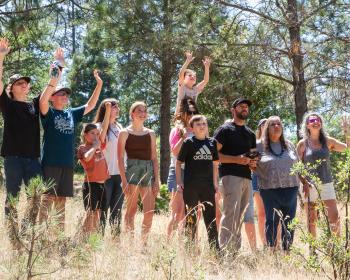Dr. Ronald Michael is a surgeon in Chicago, Illinois. He was born in Lebanon, grew up in Iraq and Lebanon, and moved to Chicago in 1967. All four of his grandparents are from what is now southeastern Turkey, along the border of northern Iraq. They fled there during the Assyrian Holocaust by Ottoman troops and Kurds during the waning years of Ottoman rule.
As complex and ancient as the Assyrian history is, can you give us some brief background?
RM: The Assyrian culture was historically concentrated in northern Iraq. Our history is over 6,700 years old, as we are the indigenous people of Iraq. Even though the Assyrian empire ended in 612 B.C., detailed records show their continued presence up until today. The last great capital of Assyria was Nineveh. The earliest habitation levels of Nineveh go back to 4,750 B.C. We have lived there continuously since that time, and we predate any other people in the area today by literally millennia.
Assyrians were some of the first people to accept Christianity. When the Arabs conquered the region in the 7th century A.D., Arabic supplanted Aramaic, the lingua franca of the region at the time. Aramaic, the language spoken by Jesus Christ, had been the lingua franca of the region from the latter periods of the Assyrian empire, 8th and 9th centuries B.C., until around the 7th century A.D. Over time, Assyrian Christianity divided into four main sects, adhering to different churches: Syriac Catholics, Syriac Orthodox, Chaldean Catholic (Roman Catholic offshoot of the Church of the East), and the Church of the East. Further divisions occurred when Western missionaries arrived in the 19th century and gained converts to Protestant denominations, including Presbyterianism.
Can you tell us about the Assyrian language?
RM: The language is Semitic, related to Arabic and Hebrew, but quite distinct from both. Assyrians have been using Aramaic since at least the 8th century B.C. It is safe to say that there are at least four million Assyrians today. Many still speak modern Assyrian, or Syriac or Aramaic, or NeoAramaic, as it is variously known.
We work towards preserving our language. It is the language of Christ, and we are passionate about preserving it. Mandaens, Samaritans, and Assyrians use this language, and the other Iraqis that historically used the language were Iraqi Jews. There were many languages and cultures that were lost when the area from Iraq to Morocco was Arabized.
Why is all this important today?
RM: Ninety percent of the world’s 6,000 languages are expected to die within the next generation or two. To explore this alarming statistic and the facts surrounding it, you should read “Vanishing Voices; The Extinction of the World’s Languages” by Daniel Nettle and Suzanne Romain.
What forms of discrimination and challenges do Assyrians face in the Middle East?
RM: In the lands where we have lived continuously for nearly 7,000 years we are treated like second-class citizens. While freedom of religion is a right for which we fight, it is not our only struggle. We work to preserve our culture, not just our religion. Many Middle Eastern governments try to use the churches to divide the people. An example of this is Iraq, which tries to manipulate the Chaldean difference – which is not really a difference — by pitting us against each other. Just like the old fashioned “divide and conquer”. Both the Iraqis and Kurds find differences among the Assyrians, and try to use these differences to weaken us. As a minority, we are not only discriminated against because of our religion, but also because of our language and ethnicity.
Iraq’s tolerance is only towards those who reject their religion and ethnicity, as they try to Arabize the country. There are endless examples of how Iraq does this. Assyrians cannot have Assyrian names, and if they do they cannot get government recognition. The only way to advance in Iraq is to deny your ethnicity. If you wish to succeed, you cannot have a non-Arab nationalist consciousness. Iraqi textbooks mention Assyrians as “ancient Iraqis” or “Iraqi Christians”. In northern Iraq, under Kurdish rule, Assyrians cannot seek advanced degrees unless they join the KDP (Kurdistan Democratic Party). This is a tactic that was used by Stalinist Russia.
Are there tensions between Kurds and Assyrians?
RM: We are just under ten percent of the Iraqi population, and Kurds are roughly 15 percent. Crimes committed by Kurds against Assyrians are never prosecuted. [Even Kurds killing Assyrians is tolerated by the KDP.] The lack of justice in crimes that harm Assyrians is overwhelming and unjustifiable. I would urge your readers to visit www.aina.org for documented examples of this.
What is the chief objective of the Assyrian American League?
RM: Lobbying the U.S. government is one of our main objectives. We also strive to educate the pertinent branches of the U.S. government, and state governments, about our plight. We want them to know who we are, what we want and why it is in America’s best interest to help us.
We do not want our Assyrian representatives chosen by outsiders, as the Kurds have done recently. Assyrian Democratic Movement representatives have been invited to the various Iraqi opposition meetings, but the Kurds select some of their own handpicked puppets, to dilute our presence, and to divide us.
We simply want to speak our language, build our churches, and educate our children. We should not have to fight for these basic things. Our energies should be invested in helping to solve the world’s problems, not fighting for what should be basic, universal human rights.
Do you think your organization has been successful in achieving its goals?
RM: I think it has been successful to an extent. The State Department has invited us to Iraqi opposition proceedings. The Iraq Liberation Act has been expanded to include the Assyrian Democratic Movement as a legitimate Iraqi opposition group eligible to receive American aid. We alerted President Bush that he did not include us in his speech to the United Nations. The President did later recognize us as an essential component in Iraq in his next Foreign Policy speech in Cincinnati, Ohio, saying, "The oppression of Kurds, Assyrians, Turkomans, Shi'a, Sunnis and others will be lifted. The long captivity of Iraq will end, and an era of new hope will begin.” This encouraged us to believe that all of Iraq’s ethnic groups will chart the future course of Iraq. This attention is important to us, as it is the first time Assyrians were recognized by a U.S. President.
What are your views on Assyrian attitudes towards the current crisis with Iraq?
RM: We support the U.S. objective of regime change in Iraq. But we do not want to replace the tyranny of Saddam, with the tyranny of a new Saddam, or of the Kurds. There has never been a tradition of democracy in Iraq, so if America leaves after regime change, there may be total chaos. We have to build institutions they do not yet know, establish a totally new mind-frame, and this will take time. I think Japan and Germany were good models for postwar reconstruction and institution building. Iraq is a country that is very wealthy in natural resources, technologically advanced, and with a sound educational system. Iraqis have a long tradition of culture, education and literacy. Iraq may prove very fertile ground for democratic institutions to germinate. It will take a long time, however, and the U.S. must be prepared to remain engaged until that time arrives.
Could you tell us a bit more about AAL’s activities?
RM: The organization meets regularly. It is based in Chicago, but in touch with Iraqi groups around the world on a regular basis. This can be difficult, unpredictable, and risky because of the political situation in certain Middle Eastern countries.
Any final thoughts?
RM: My challenge to Arab intellectuals, Arab Governments, and the broader Arab and Islamic world is to push as vigorously for Assyrian rights as they do for Palestinian rights. Otherwise, they lack credibility and run the risk of appearing hypocritical. Assyrians must be at the table, as non-Assyrians will not look after Assyrian rights. We constitute ten percent of Iraq’s population. Our voice must be heard.
Please visit http://www.aanf.org/ to learn more about the Assyrian American League and the topics discussed in this interview.


